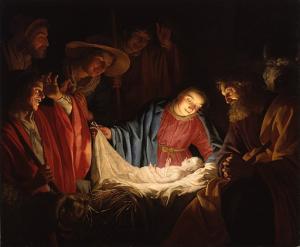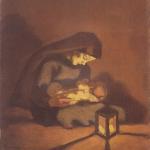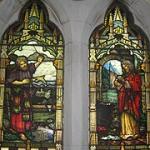
She didn’t expect to be changing eternity. Like many Jewish girls, at age 14 she was promised for marriage,1 not expecting to leave the small village where she was born. But her life and her destiny changed immediately as the Angel Gabriel stood before her and greeted her: “Hail, thou that art highly favoured, the Lord is with thee: blessed art thou among women.” Though slightly puzzled by the greeting, neither then nor afterward would she ever question or doubt she was fulfilling a sacred call.
Gabriel and Mary
Outwardly Mary was a simple peasant girl, but God knew her well, and so did Gabriel. He continued, “Fear not, Mary: for thou hast found favour with God.” About 600 years earlier, Nephi had seen Mary and her child. Bruce R. McConkie (when an apostle) would write that Mary had been among the most valiant spirits in the premortal existence.2
Gabriel continued, Mary should “bring forth” a son, an heir to the throne of David, but “of his kingdom there shall be no end,” for He would be “the Son of God.” Being a virgin, Mary wondered how (not whether) this would happen. “The Holy Ghost shall come upon thee, and the power of the Highest shall overshadow thee.” Only a young woman who had received a sacred call in total faith could have answered, “Behold the handmaid of the Lord; be it unto me according to thy word” (Luke 1:31-18).
Mary and Elisabeth
Gabriel introduced blessed support prepared for Mary, also reaching from and through the eternities: the pregnancy and upcoming birth blessing her worthy cousin Elisabeth.
Elisabeth, like Mary, was carrying a child of eternal promise—a sacred call. She and her husband, Zacharias, were “righteous before God,” keeping all the commandments and ordinances. Gabriel stood beside Zacharias, who was burning incense in the temple.
Zacharias had been praying for a child. He was promised a son who would prepare the people for the coming of God’s son. As he and Elisabeth were both elderly, he had a proof problem—a sign perhaps? His sign was to be unable to speak until the child was born. Unlike Mary and Elisabeth, he was stuck in probability.
The Holy Ghost told Elisabeth of Mary’s condition and the holy child she would bear. When she heard Mary approaching her home, Elisabeth, felt a strong movement from her own baby; she greeted Mary, “And whence is this to me, that the mother of my Lord should come to me?” Ensign author Aspen Stander explained,
Elisabeth received the gift of prophecy as she bore testimony of Jesus Christ and showed reverence for His mother long before His earthly ministry began.
Elisabeth provided spiritual and emotional as well as physical support to Mary. She took Mary into her care at a time when both women felt vulnerable and lonely, and the two were strengthened together. They rejoiced together in the “impossibility” that had become their reality.3
In a beautiful outpouring of prophesy and emotion, Mary expressed her testimony of receiving a sacred call, beginning,
My soul doth magnify the Lord,
And my spirit hath rejoiced in God my Savior.
After three months in Elisabeth’s care, Mary returned home.
Mary and Joseph, A Sacred Call Shared
Joseph’s first reaction to Mary’s pregnancy shows unselfish love. Mary could be stoned or live a life of public humiliation. So he planned a private end to their engagement.
Again, angelic help was needed and given: an angel told Joseph in a dream to remain with Mary, as her child was “of the Holy Ghost.” He learned the name and heavenly destiny of the child. Awakening, Joseph carried out the angel’s instruction: arranged for the marriage, but “knew her not'” until after the child’s birth (Matthew 1:20-250 ). Joseph, like Mary and Elisabeth, did not question or doubt.
The journey to Bethlehem is portrayed often in stories, music, drama, and various visual arts. Despite prevalence in Christmas carols and creches, scriptures make no mention of a donkey for Mary to ride3 or of animals being present in the stable.4 A sacred call can attract tradition, and some animals may have been filled in. The wise men required a year or more of travel,5 but they are symbolically in the creche mix.
Scriptures do not focus on Joseph at the manger. With his powerful love of Mary and angelic testimony of the Child, he would give the mental, and spiritual strength that Mary needed, as well as protection for Jesus. These lifelong roles he assumed and fulfilled, a sacred call eternally.
Joseph saw the light of the star, heard the songs of the angels, listened to the testimonies of the shepherds. The scriptures tell us “Mary kept all these things, and pondered them in her heart.” Joseph also had a sacred call; he must have pondered as well.
When Joseph and Mary brought Christ to the temple to dedicate Him and a sacrifice to the Lord, they heard together the pronouncements and prophecies of Simeon and Anna. “Joseph and his mother marveled.”
The wise men arrived at the family’s Bethlehem home with reverence, love, and gifts. When these visitors left, Joseph had another angelic dream; he was to flee taking Mary and Jesus to Egypt, remaining until the angel came again. The gold from the wise men had arrived in time to pay for the trip. For this family with a sacred call, obedience was timely and complete. When the angel told them to return, they left Egypt for Galilee.
The miracle in a manger brought together three heaven-dedicated individuals, angelic messengers and attendants, and a host of others who were worthy to be part of it. It was Christ’s perfect entrance into an imperfect world that He would save.













